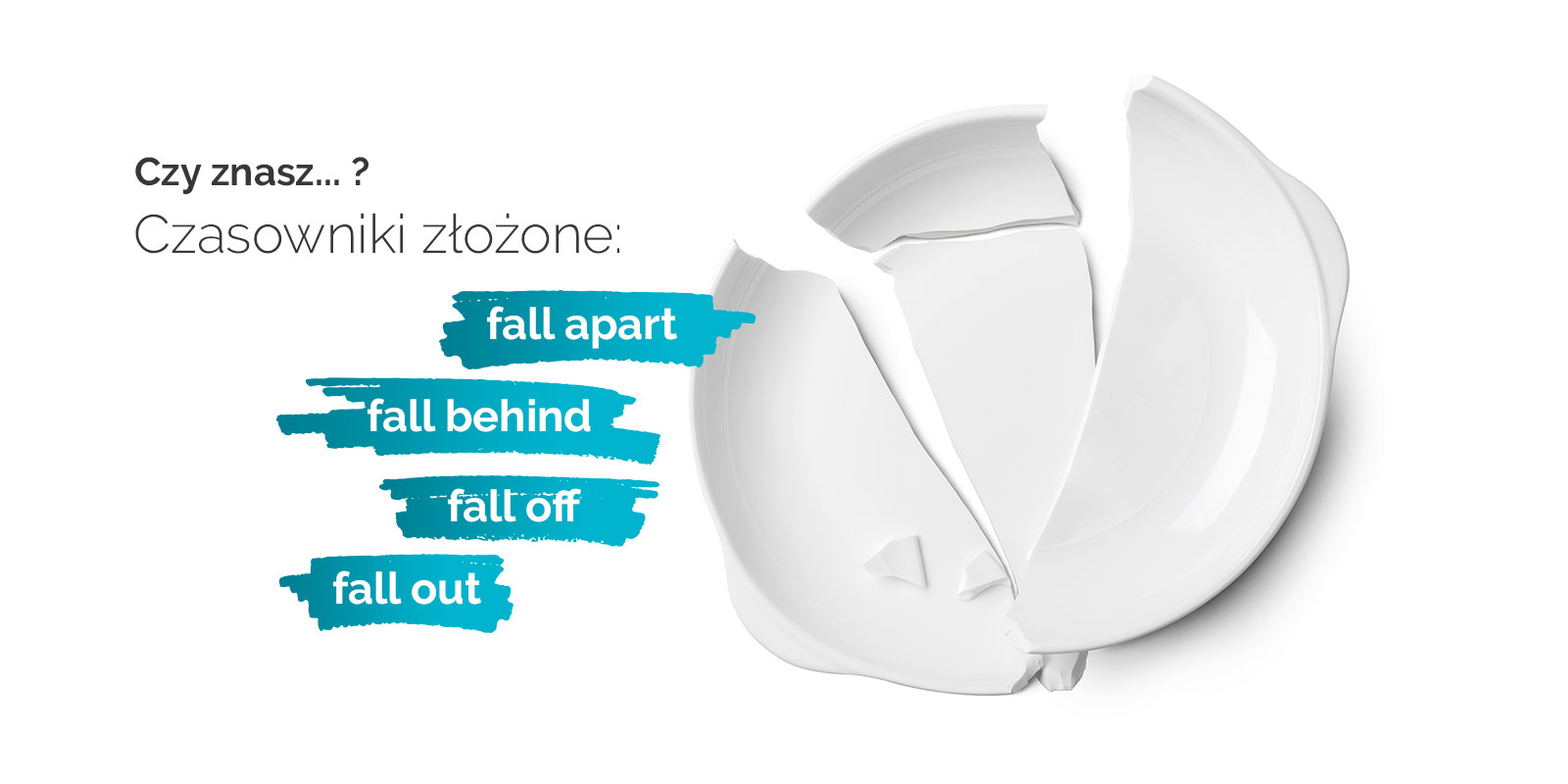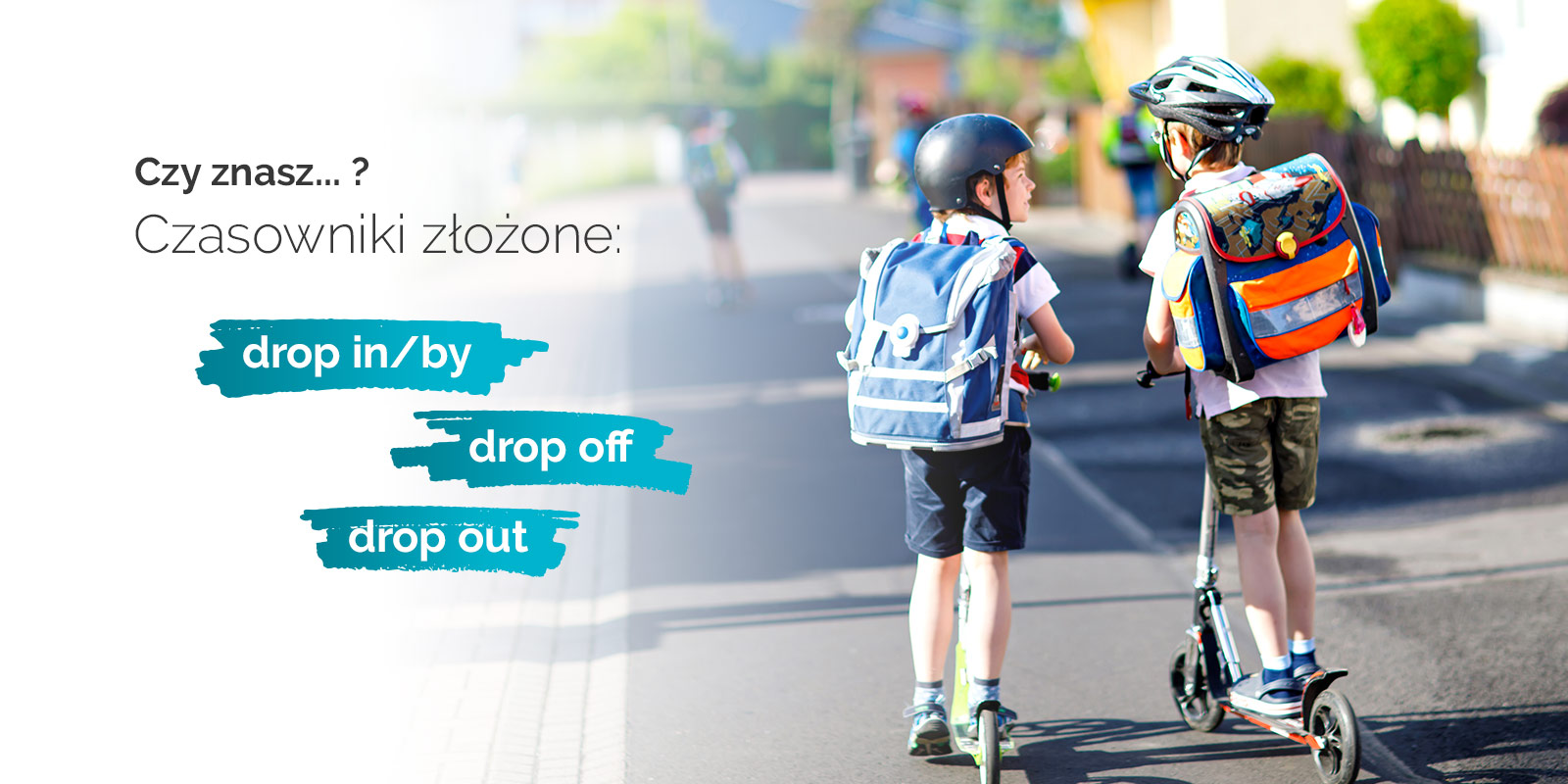Phrasal verbs: November, 2021
CARRY OFF – zdobyć (np. nagrodę, medal)
Przykład: Kerry carried off first prize in the painting competition.
CARRY ON (WITH) – kontynuować, robić dalej, nie przerywać
Przykład: In spite of the rain, they carried on with the show.
CARRY SOMETHING OUT / CARRY OUT SOMETHING – przeprowadzać coś (np. eksperyment, badanie), realizować coś, wykonywać coś
Przykład: Volunteers carried out the clean-up after the festival.
BE/GET CARRIED AWAY – dać się ponieść emocjom, stracić panowanie nad emocjami, zapędzić się
Przykład: They got so carried away with the game that they didn't realise the time.
CARRY SOMETHING THROUGH – zrobić coś mimo trudności, ukończyć coś mimo przeszkód
Przykład: He was determined to carry the project through despite the problems involved.
→ Zrób ćwiczenia! Przejdź do sekcji: What have you learnt this month?
Phrasal verbs: June, July, August 2021
CHECK IN (to a hotel / at the airport) – zameldować się (w hotelu/ na lotnisku)
Przykład: What time should we check in at the airport?
TAKE OFF – startować (o samolocie)
Przykład: What time does our plane take off?
WIND OFF – relaksować się, odpoczywać
Przykład: In June I will have two weeks to wind off in Spain.
GO AWAY – wyjechać, udać się na wakacje
Przykład: Where are you going away this summer?
SOAKING UP – doświadczać, przeżywać
Przykład: I love soaking up the Spanish atmosphere.
→ Zrób ćwiczenia! Przejdź do sekcji: What have you learnt this month?
Phrasal verbs: May, 2021
GO BY – przechodzić obok
Przykład: I went by my favourite Coffee Shop and met my best friend.
GO OFF – wybuchać (o bombie) / gasnąć (o światłach) / psuć się (o jedzeniu)
Przykład: The bomb went off exactly at 1 o’clock.
GO ON – dziać się dalej, kontynuować
Przykład: At first I didn’t know what was going on inside my head.
GO THROUGH – przeglądać
Przykład: I’ll go through these reports quickly to see if there are any mistakes.
GO ALONG – kontynuować
Przykład: He paused for ten seconds and then he went along with the speech.
→ Zrób ćwiczenia! Przejdź do sekcji: What have you learnt this month?
Phrasal verbs: April, 2021
LOOK AFTER (SOMEONE/SOMETHING)
look after (someone/something) = opiekować się kimś/czymś
Przykład: At Monday morning I have to look after my younger sister.
LOOK DOWN ON
look down on = patrzeć z góry, z pogardą
Przykład: I don’t like when people look down on others.
LOOK FORWARD TO
look forward to = czekać z niecierpliwością, cieszyć się na
Przykład: I look forward to seeing you again.
LOOK OUT
look out = uważać, być ostrożnym
Przykład: Look out! You are going to fall down.
LOOK UP TO
look up to = podziwiać kogoś
Przykład: I look up to my brother. One day I want to be just like him.
→ Zrób ćwiczenia! Przejdź do sekcji: What have you learnt this month?
Phrasal verbs: March, 2021
GET BACK TO
get back to = wracać do jakiejś czynności
Przykład: Stop talking, we should get back to work.
GET ON
get on = wsiadać
Przykład: Emily got on the bus and went to shopping mall.
GET ON WITH
get on with = mieć dobre relacje z kimś
Przykład: I get on well with my parents.
GET OVER
get over = pokonać, przezwyciężyć
Przykład: Last week my sister got over her fears. She has been holding spider.
GET UP
get up = wstawać z łóżka
Przykład: I usually get up at 8 o’clock.
→ Zrób ćwiczenia! Przejdź do sekcji: What have you learnt this month?
Phrasal verbs: February, 2021
TAKE AFTER SOMEBODY
take after somebody = być do kogoś podobnym w zachowaniu, wyglądzie; mieć coś po kimś
Przykład: Jim tooks after his mother in being honest.
TAKE SOMETHING APART
take something apart = rozłożyć coś na części
Przykład: We took the car’s engine apart to see why it stopped working.
TAKE SOMETHING OFF
take something off = ściągnąć coś, ściągnąć ubranie
Przykład: She quickly took her wet top off.
TAKE SOMEBODY OUT
take somebody out = zabrać kogoś gdzieś
Przykład: Jack took Molly out for a date.
TAKE UP (AN ACTIVITY)
take up = podjąć, rozpocząć jakąś aktywność
Przykład: Katy took up swimming classes when she was 5.
→ Zrób ćwiczenia! Przejdź do sekcji: What have you learnt this month?
Phrasal verbs: January, 2021
MAKE AFTER SOMETHING
make after something = biec za czymś, gonić coś
Przykład: I like when my dog makes after his ball.
MAKE AWAY WITH SOMETHING
make away with something = ukraść coś
Przykład: I was drinking coffee when the thief made away with my purse.
MAKE SOMETHING INTO SOMETHING
make something into something = zrobić coś z czegoś
Przykład: My dad took a piece of paper and made it into a plane.
MAKE IT UP TO SOMEBODY
make it up to somebody = zrekompensować coś komuś
Przykład: After the quarrel, Jim wanted to make it up to Katy by taking her out for dinner.
→ Zrób ćwiczenia! Przejdź do sekcji: What have you learnt this month?
Phrasal verbs: December, 2020
BRING UP
Bring up (a subject) = podjąć/zacząć temat
Przykład: The theme of recycling was brought up by the president.
PICK UP
Pick up = podnieść jakąś rzecz
Przykład: Go back to your room and pick up your clothes from the floor.
GO UP
Go up = podnieść się, rosnąć (o cenach)
Przykład: I hate when prices during winter go up.
SPEAK UP
Speak up = mówić głośniej
Przykład: You have to speak up when talking to my grandma. She is nearly deaf.
LOOK UP
Look up = podnosić wzrok, patrzeć w górę
Przykład: Look up! You are going to hit the ceiling.
→ Zrób ćwiczenia! Przejdź do sekcji: What have you learnt this month?
Phrasal verbs: September, 2020
TURN BACK
Turn back = zawracać
Przykład: We wanted to turn back but we had no idea which way to go. There were no tracks in that forest.
TURN INTO
Turn into = zamienić (w coś), przeistoczyć się (w kogoś lub coś)
Przykład: Medusa was a mythological creature which was supposed to be able to turn people into stones with her eyes.
TURN ON / TURN OFF
Turn on / Turn off = włączać / wyłączać
Przykład: Oh no! I forgot to turn off the oven!
TURN DOWN
Turn down:
- ściszać
Przykład: They always play loud music in the dorms. Why can’t they turn it down? - odrzucać (np. zaproszenie, ofertę pracy)
Przykład: If I were Elizabeth Bennet, I wouldn’t turn down Mr. Darcy’s invitation.
TURN OUT
Turn out = okazać się
Przykład: It turned out we bought the same book for each other. Coincidence?
TURN TO
Turn to = zwracać się (do kogoś)
Przykład: Although he hated Daphne, he turned to her when he needed help in studying.
TURN UP
Turn up = pojawić się, zjawić się
Przykład: Clinton, you didn’t turn up to our party last Saturday. What happened?
→ Zrób ćwiczenia! Przejdź do sekcji: What have you learnt this month?
Phrasal verbs: May, 2020
PUT OUT
Put out = zgasić, ugasić
Przykład: Don’t forget to put out the fire before you leave the camping site.
PUT UP
Put somebody up = pozwolić komuś zatrzymać się u siebie w domu, przenocować kogoś
Przykład:
A: Where are you going to stay?
B: Bill’s going to put us up for the night, mum. No worries, he already agreed.
PUT ON
Put on = zakładać na siebie (np. ubranie)
Przykład: No, no, you are not going anywhere unless you put on something decent.
PUT UP WITH
Put up with = tolerować, znosić (kogoś lub coś)
Przykład: From now on you will be leaving your phones in that green box before the class starts. I’m not going to put up with your behaviour anymore.
PUT OFF
Put off = przełożyć coś na później
Przykład: Jack had to put off the meeting. Something urgent has come up so please wait a little longer.
→ Zrób ćwiczenia! Przejdź do sekcji: What have you learnt this month?
Phrasal verbs: April, 2020
PASS BY
Pass by = przechodzić, przejeżdżać obok
Przykład: I pass by that florist’s at 5 am every day and that old man is already there.
PASS ON
Pass on = przekazywać
Przykład: Take one sheet of paper and pass the rest on.
PASS AWAY
Pass away = odejść (umrzeć)
Przykład: He passed away at the age of 98. What a long life he had!
PASS OUT
Pass out = zemdleć
Przykład: Janice’s migraines are so strong that she sometimes passes out.
→ Zrób ćwiczenia! Przejdź do sekcji: What have you learnt this month?

Phrasal verbs: March, 2020
MAKE FOR
Make for = kierować się do
Przykład: People were making for the exit and ramming the closed door in panic.
MAKE OUT
Make out = zrozumieć coś, dostrzegać coś, dosłyszeć coś
Przykład: Historians finally completed their project and made out what the king said on his deathbed.
MAKE UP
Make up = pogodzić się
Przykład: Cole was invited to that party and that’s why I’m not going. I’ve never made up with him after that fight four years ago.
MAKE UP FOR STH
Make up for sth = zrekompensować coś
Przykład: I baked this cake for John to make up for my terrible behaviour.
→ Zrób ćwiczenia! Przejdź do sekcji: What have you learnt this month?
Phrasal verbs: February, 2020
BRAKE UP
Break up = rozstać się, zerwać ze sobą
Przykład: Mark is arguing with Alice all the time. I think they will break up soon.
MAKE UP
Make up = pogodzić się
Przykład: I hope that Meggie will make up with David soon.
ASK SB OUT
Ask sb out = zaprosić kogoś na randkę
Przykład: Tom asked me out to the cinema on Saturday night.
FALL FOR SB
Fall for sb = zakochać się w kimś
Przykład: My best friend told me that the moment she saw my cousin, she fell for him completely.
CHAT SB UP
Chat somebody up = podrywać kogoś
Przykład: Look at Sam! He’s chatting Elisa up and dancing with her all night.
→ Zrób ćwiczenia! Przejdź do sekcji: What have you learnt this month?
Phrasal verbs: January, 2020
GO ON
Go on doing sth = kontynuować, robić coś dalej
Przykład: Jim wanted to talk to Jasmine but she just went on drinking her coffee without saying a word.
Go on about sth = ciągle o czymś mówić
Przykład: Don't go on and on about the same thing!
Go on = dziać się
Przykład: What’s going on here?
GO THROUGH
Go through = przeglądać
Przykład: I’ve been going through all those documents for the last 8 hours and my eyes are red now.
GO BY
Go by = upływać (o czasie)
Przykład: Time goes by so slowly for those who are waiting.
Go by = mijać, przechodzić
Przykład: I bumped into someone while going by the chemist’s.
GO DOWN
Go down = zachodzić (o słońcu)
Przykład: Sue stayed on the beach all day, till the sun went down.
Go down = spadać (o temperaturze, o cenach)
Przykład: Our prices have to go down if we want to attract customers again.
Go down = tonąć
Przykład: "The captain goes down with the ship."
GO OFF
Go off = wybuchnąć (o bombie)
Przykład: The bomb suddenly went off. Five people died on the spot and four more were taken to hospital.
Go off = gasnąć (o światłach)
Przykład: Suddenly all the lights went off and we had to look for some candles to light up the room.
→ Zrób ćwiczenia! Przejdź do sekcji: What have you learnt this month?

Phrasal verbs: December, 2019
Fall apart znaczy „rozpaść się, zakończyć się”, także: „załamać się”.
Przykład: They had a serious quarrel yesterday and their friendship fell apart. I think it’s for good this time.
Fall behind to „zostawać w tyle”.
Przykład: He’s been falling behind in work for a while now. Mark is thinking of firing him.
Fall for czyli:
1) „zakochać się w kimś”
Przykład: I can’t believe someone fell for my stupid brother. Good luck with him, girl.
2) „dać się na coś nabrać”
Przykład: Be careful, Ronnie. I know he’s charming but that’s exactly why people fall for his lies.
Fall off znaczy „spaść, zmniejszać się”.
Przykład: Billy tried to climb the chair and fell off it. Fortunately, it ended with a few bruises.
Fall out with znaczy „pokłócić się, zerwać”.
Przykład: Rosie, did you just fall out with your best friend over a plush toy?
→ Zrób ćwiczenia! Przejdź do sekcji: What have you learnt this month?
Phrasal verbs: November, 2019
Drop by/in to „wpadać z wizytą”
Przykład: If you are in the town, don’t hesitate and just drop in.
Drop off znaczy:
- „podwieźć kogoś”
Przykład: Are you sure you don’t want to go to that bookstore? I could drop you off on my way to Henry’s. - „przysnąć”, „odpłynąć”
Przykład: I can’t believe I dropped off during the lecture. This is so embarrassing.
Drop out czyli „odpaść”, „rzucić”
Przykład: Ronald decided to drop out of our college. He wants to start working now.
→ Zrób ćwiczenia! Przejdź do sekcji: What have you learnt this month?
Phrasal verbs: October, 2019
Cut down czyli:
- "ograniczać", "zmniejszać" (np. ilość, częstotliwość)
Przykład: Our teacher encouraged us to cut down plastic usage. - "skrócić", "ściąć"
Przykład: After John dumped her, she cut down her hair. I guess she needed a change.
Cut down on znaczy „ograniczać" (coś)
Przykład: If I were you, I’d seriously cut down on sugar. It’s unhealthy.
Cut off czyli „odciąć" (np. metkę, prąd), "przerwać" (komuś)
Przykład: After the storm, almost the whole town had their electricity cut off.
Cut in znaczy:
- "wtrącać się", "przerywać"
Przykład: She shows no respect to anyone - she is always cutting in! No matter who is speaking. - "zajechać drogę" (samochodem)
Przykład: Who gave him a driving license? He keeps cutting in in front of other cars!
→ Zrób ćwiczenia! Przejdź do sekcji: What have you learnt this month?
Phrasal verbs: September, 2019
Get away with znaczy „ujść na sucho, uniknąć kary (za coś)”.
Przykład: I’m sure this time he won’t get away with it and get punished.
Get back to czyli „wrócić do wcześniej wykonywanej czynności”.
Przykład: Hurry up, Rachel! There’s no time to waste. You’ll get back to cooking later.
Get on znaczy:
- "wsiadać" (np. do autobusu)
Przykład: There’s no way to catch him now. He got on that plane. - "robić postępy"
Przykład: I’m getting on quite well, so I hope I’ll finish this project tomorrow.
Get on with czyli „mieć z kimś dobre stosunki”.
Przykład: I don’t get on with my new classmates. They aren’t friendly at all!
Get over to „dojść do siebie, przezwyciężyć (chorobę, problemy, porażkę itp.)”
Przykład: Amy had lots of problems but with our help she got over them.
→ Zrób ćwiczenia! Przejdź do sekcji: What have you learnt this month?
Phrasal verbs: 22nd May, 2019 – 28th May, 2019
Give something away znaczy "zdradzać coś" (np. sekret)
Przykład: I bought Ruby a Darth Vader action figure as a surprise, but Tom gave it away.
Give back czyli "zwrócić, oddać"
Przykład: Did you give back Star Wars DVD?
Give off znaczy "wydzielać" (np. ciepło, zapach), "wydawać" (np. dźwięk)
Przykład: Your sandwich is giving off a nasty smell.
Give up czyli "poddać się, zaprzestać, zrezygnować"
Przykład: Sam gave up trying to become a film actor.
Give in znaczy "poddać się, ulec, zgodzić się na coś pod presją, przestać rywalizować, ustąpić"
Przykład: Han Solo never gives in without a fight.
→ Zrób ćwiczenia! Przejdź do sekcji: What have you learnt this week?
Phrasal verbs: 15th May, 2019 – 21st May, 2019
Come across znaczy “spotkać kogoś przypadkiem, natknąć się na kogoś/coś”.
Przykład: Penny, you won't believe who I came across yesterday!
Come back znaczy “wracać, powracać”.
Przykład: She is so happy that Jack is coming back in one week.
Come round/over oznacza “przyjść, przyjechać, wpaść (do kogoś z wizytą)”.
Przykład: Why do you always refuse when I invite you to come over?
Come into znaczy “wchodzić, wejść”, ale też “odziedziczyć w spadku”.
Przykład: I came into a huge sum of money when my uncle died.
→ Zrób ćwiczenia! Przejdź do sekcji: What have you learnt this week?
Phrasal verbs: 8th May, 2019 – 14th May, 2019
Take after czyli "być podobnym do kogoś, wdać się w kogoś"
Przykład: Phil takes after his mum - they both get stressed easily.
Take over znaczy "zdobyć, przejąć"
Przykład: Kate is very anxious about taking over her family's shop.
Take up czyli "zainteresować się czymś (np. uprawianiem sportu), podjąć się czegoś"
Przykład: You can take up jogging to relieve stress.
Take off znaczy:
1) zdjąć (np. ubranie)
Przykład: You should take off your hat when you are indoors.
2) startować (o samolocie)
Przykład: We'd better hurry - the plane takes off in 15 minutes!
→ Zrób ćwiczenia! Przejdź do sekcji: What have you learnt this week?
Phrasal verbs: 1st May, 2019 – 7th May, 2019
Run down znaczy "krytykować", ale także "tracić moc" (np. o baterii)
Przykład: I wanted to call you yesterday but my phone ran down.
Run into znaczy "spotkać kogoś przypadkiem", ale także "napotkać problem/trudność"
Przykład: As I was going down the street, I ran into my History teacher.
Run off znaczy "uciekać" (nagle opuścić jakieś miejsce)
Przykład: When I was a kid, I wanted to run off home.
Run out znaczy "tracić ważność" (np. o prawie jazdy) oraz "kończyć się", "wyczerpywać się"
Przykład: My seasonal ticket ran out and I'll have to buy a new one.
Run out of znaczy "wykorzystać do końca", "nie mieć już"
Przykład: We ran out of flour. Could you go to the shop and buy a bag?
→ Zrób ćwiczenia! Przejdź do sekcji: What have you learnt this week? *
* Na podst. James Milton, Bill Blake, Virginia Evans, A Good Turn Of Phrase: Advanced Practice in Phrasal Verbs
Phrasal verbs: 24th April, 2019 – 30th April, 2019
Break down znaczy "zepsuć się"
Przykład: Jake's car broke down just as it started snowing.
Break into czyli "włamać się"
Przykład: The man broke into the building through the back door.
Break out znaczy "wybuchnąć (np. o wojnie, epidemii, pożarze)"
Przykład: Fire broke out so we had to leave the building.
Break up czyli:
1) "rozstać się"
Przykład: Her parents broke up, but then they got back together!
2) "kończyć naukę przed feriami lub wakacjami"
Przykład: I couldn't wait for school to break up and the holidays to begin.
→ Zrób ćwiczenia! Przejdź do sekcji: What have you learnt this week?
Phrasal verbs: 17th April, 2019 – 23rd April, 2019
Look after znaczy "zajmować się, opiekować się"
Przykład: Julie looks after our children while we are at work.
Look for czyli "szukać"
Przykład: Helen is looking for a good book to read.
Look forward to znaczy "oczekiwać na coś z niecierpliwością, nie móc się doczekać"
Przykład: Jane is looking forward to her graduation.
Look up znaczy "znajdować, wyszukiwać (np. informacje w słowniku)"
Przykład: I have forgotten the number - let me look it up.
Look around for czyli "rozglądać się za kimś/czymś"
Przykład: I need to look around for my little brother because I have lost him in the crowd.
→ Zrób ćwiczenia! Przejdź do sekcji: What have you learnt this week?
Phrasal verbs: 9th April, 2019 – 16th April, 2019
Keep on doing something znaczy "kontynuować robienie czegoś"
Przykład: Brandon is keeping on borrowing pens from me and he is always losing them.
Keep out znaczy "nie wpuszczać"
Przykład: This party is only for VIPs so you have to keep out people without invitation.
Keep off to "nie wchodzić gdzieś, trzymać się z daleka od czegoś"
Przykład: Keep off the green belt.
Keep up with to "dotrzymywać kroku, utrzymywać ten sam poziom"
Przykład: It was hard for me to keep up with Penny on a trek. She has such long legs and she walks very fast.
Keep away from czyli "trzymać się z daleka od czegoś, unikać czegoś"
Przykład: Keep away from water, kids! It's very cold and I don't want you to get sick.
→ Zrób ćwiczenia! Przejdź do sekcji: What have you learnt this week?












